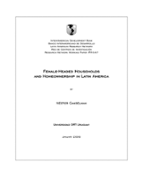Female-Headed Households and Homeownership in Latin America
Date
Jan 2008
The gender of the household head has often been treated as an exogenous determinant of homeownership. This paper argues that several determinants of homeownership also affect household headship and that failing to explicitly account for this endogeneity leads to inconsistent results. Using individual level data for Chile, Honduras and Nicaragua, the paper shows that although on average women have lower probability of being homeowners, women who head households (single, separated or divorced) have a greater probability of attaining homeownership. Thus household level analysis should control for the endogeneity of household headship in order to properly address the gender effect on housing tenure. Estimating a bivariate probit model, the paper finds evidence that femaleheaded families have a lower probability of owning their home in Latin American countries. Without the endogeneity control this result was not present in eight countries.



